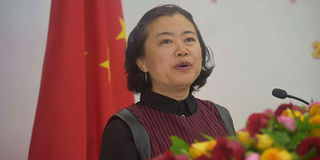Encourage intra-Africa educational exchanges to promote integration

Chinese Ambassador to Kenya Sun Baohong addresses 69 Kenyans, beneficiaries of Chinese scholarships, in Nairobi on August 22, 2018. PHOTO | FILE | NATION MEDIA GROUP
What you need to know:
- The calibre of the alumni means the West has contact persons high up in governments with whom it can use to pursue its interests.
- Intra-Africa university exchanges can redress the charge that Africans are essentially brainwashed.
As with many other forms of diplomacy, African is deficient in international educational exchange programmes.
After many years of American scholarships, the number of beneficiaries runs into thousands of influential people.
This was apparent last week during a summit on the state of African higher education in Abidjan, Cote d’Ivoire.
It was organised by the Africa America Institute, the New York-based organisation, which has been at the core of scholarships for Africans to American universities.
The forum was opened by one of its alumni, Ivorian President Alassane Ouattara. Thanks to the institute, Ouattara earned a PhD in economics from Pennsylvania University in 1972.
One of the prominent examples of education-based diplomacy that many Africans relate to is that of Barack Obama Sr whose undergraduate education in Hawaii was underwritten in part by the institute.
BENEFICIARIES
Yet, against the background of the many people who owe their enlightenment to Western education, it has become a cliché for discourses on Africa’s woes to be placed at the doorsteps of former colonisers.
Indignation towards Britain, France, Portugal, Spain, Germany and by extension the US, is sure to pepper banter in bars and universities.
Ironically, the angst towards our former colonisers sits side by side with Africa’s inclination towards the West.
Kwame Nkrumah, Jomo Kenyatta, Julius Nyerere, Kenneth Kaunda, Leopold Senghor and other leaders of the Pan-African movement were educated in Western culture and values.
To appreciate the significance of the educational exchanges between Africa and the US, one only needs to sample some of the beneficiaries of the Fulbright visiting scholar/foreign student programmes.
They include Nigerian writer Chinua Achebe (1987), former UN Secretary-General Boutros Ghali (1976) and Malawian president Peter Mutharika (1965).
POLICIES
The US International Visitor Leadership Programme has hosted Mozambican president Filipe Nyusi (2014), Faure Gnassingbe (Togo 2001), Alpha Conde (Guinea 1962) and former South African president Frederick de Klerk (1976).
The programmes aligned Western foreign policies through the years. More importantly, the calibre of the alumni means the West has contact persons high up in governments with whom it can use to pursue its interests.
Often when we think of exchanges as Africans leaving the continent in the pursuit of education, the reverse, in which talented students circulate within the continent, is possible.
African nations, universities and organisations may not have enough resources to lay out elaborate exchange plans. However, modest investments would help advance Africa’s interests.
BRAINWASHED
If the 54 countries send one student to a university in another African country, it would amount to 108 intra-Africa exchanges.
Let us persuade educational exchange organisations — the British Council, Fulbright Programme, Chinese Scholarship Council — to factor in intra-continental exchanges in their plans.
Intra-Africa university exchanges can redress the charge that Africans are essentially brainwashed.
Dr Wekesa is a media and geopolitics scholar at University of the Witwatersrand, South Africa: [email protected]





